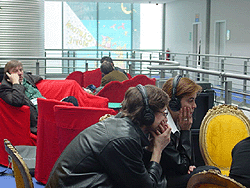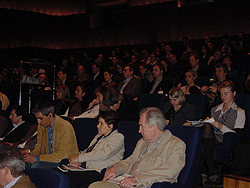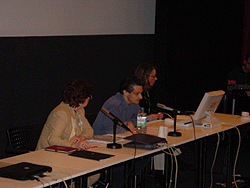Through his experienced eyes, Steven Walsh takes a look at the future of feature films in Europe. Will Cartoon Movie prove to be as successful as the Cartoon Forum? What's at stake and play...

For three days in the middle of March hundreds of would-be feature producers from all over Europe gathered in Potsdam, Germany to pitch their projects to a motley collection of theatrical distributors, TV executives, bankers, investors and sales agents from across Europe.
Cartoon's Very Real Impact
The third annual Cartoon Movie forum is the brainchild of Corinne Jenart and Marc Vandeweyer, who have been running the European Media programme's animation outfit, Cartoon, for the last 12 years. It is based on the Cartoon Forum, a get-together of animation TV producers, which has been held every year with increasing success since 1990.

When the original Cartoon Forum was set up, many in the industry thought it was a waste of time. 'None of the important buyers would attend, even if their expenses were paid, so why bother?' they said. Well, the doubters were proved wrong -- a thousand times wrong -- and today the Cartoon Forum, held every September, is an event that anyone who's anyone in the European TV animation industry cannot possibly afford to miss.
Largely as a result of Cartoon's efforts, there is today a flourishing animation production industry in Europe, but until very recently that production was almost exclusively made up of TV series and the odd commercial. Feature films were the exclusive preserve of Disney and, in the last few years, the other U.S. majors.

That is no doubt still the view of the situation from sunny Hollywood, because with the exception of the special case Chicken Run from Aardman Animations, European-made animated features simply don't make it in the U.S. market. The fact that several "Made in Europe" movies have made big money in Europe hasn't yet figured on American radar-screens.
The root cause of the problem is that the animated features that get made in Europe have tiny production budgets and get virtually no promotion. Production budgets rarely exceed US$10,000,000 and are often less than $5,000,000; promotional budgets are usually ZERO. So when they do get made, usually after years of struggle to get together a barely adequate budget, they often fail to get an audience in the English-speaking world, even if a few of them do really well in their home market.

A Thousand Doors
The get-together in Potsdam is an attempt to do something about this by bringing together producers and potential distributors. The three-day event consists of pitch sessions for pre-selected projects, a chance to hold further discussions about projects pitched last year and a whole slew of one on one meetings.
For U.S. producers to get an animated feature off the ground, there are a few doors to knock on, all of them well known and most of them in the business of distributing theatrical movies. For European producers, as the motley collection of so called financiers attending the Cartoon Movie Forum shows, there are hundreds of doors to knock on. Europe remains a very fragmented market. There is no such thing as a pan-European deal and, yet, to finance a feature, a producer needs to access funds from several territories.

Animated features made in Europe are a fairly recent commodity and theatrical distributors are only just beginning to cotton on to this. Those who have, tend to be small, not-very-well-financed companies that aren't in a position to commit several years in advance to substantial m.g.'s (minimum guarantees).
Where then can a European producer turn to get his animated feature financed? From a range of sources including video distributors, TV stations, public funding bodies and investment funds. The money's there, but getting it is far from simple, and getting enough of it by American standards is well-nigh impossible.
Of the 61 projects due to be presented in Potsdam, maybe five will actually get made, and of those, two or three may get proper releases outside their home territory. If you think that's depressing, think that the situation today is a whole lot brighter than it's ever been before!

Different Answers to Funding
The European Union may wish it otherwise, but the sad fact is that there is no such thing as a European producer. When it comes to financing films in Europe, your nationality, and the country you work in, is what counts. So there are in fact 15 different answers -- as many answers as there are countries in the Union -- to the question, 'How does a producer from the European Union get his or her movie financed?'
In Holland, Luxembourg and Ireland there are tax breaks; in Austria, Belgium, Italy, Spain, Portugal, Greece, Denmark, Sweden and Finland there are various kinds of public funding. It would be very boring if I attempted to run through the complete list, but you will see just how varied the picture is if you read where a producer can find funding in the big three territories -- Germany, France and the U.K.

If you're a German producer you probably have the best chance of financing your animated feature, provided it's based on a well-known German property like Werner or Little Asshole (both of which made a lot of money at the German box office but were never sold abroad). The success of such movies means that distributors like Neue Constantin and Kinowelt will back other such projects, as will German broadcasters, regional subsidy funds and even private investors. If the project isn't based on a classic German property, then it's a whole lot more difficult to get a commitment from a theatrical distributor, and therefore to get any kind of backing. For the right project it's probably possible to raise between $4 and $8 million out of Germany alone, but only if you're a German producer.
In France, most of the money's always going to come from television, because French broadcasters, whether state-owned or private, have to devote a certain percentage of their annual budgets to French productions, and in particular to backing French films. The enormous success of Michel Ocelot's Kirikou two years ago has made a few French distributors much keener on animated features than they used to be, and there are several who are prepared to back a feature with a financial commitment even if they can't pre-buy all rights. TF 1 Video, now the country's leading sell-through label, will also back movies. Finally, of course, French producers can get various forms of subsidy from the Centre National du Cinéma (CNC), all of which helps. But unless a movie has a really small budget ($3.5 million maximum) French producers need to look abroad for some of their money.

In the U.K. where there is no subsidy system and the theatrical market is considered to be really difficult, money for features is very tough to find. In the last couple of years Pathé, Icon and Miracle Communications have released animated movies, but with the exception of Pathé's Chicken Run, not much money has changed hands.
U.K. producers therefore have to rely on the Film Council, the National Lottery and, if they're lucky, a TV pre-buy. There is still a certain prejudice about animated films, just as there is about animated series. 'Oh, they're for children, so we don't have a proper budget for them,' is what you'll hear people say. Until a few European animated films make money at the box office, that's going to be the story. In the meantime Disney and DreamWorks reign supreme.

The "C" Word
Supposing, then, that a producer has a project, which is going to cost $15 million. Even if he's German he'll be hard put to raise as much as half of that. If he's British or French, he may be able to scrape together a quarter from his home territory.
How then can a deficit be funded? Well, the name of the game is co-production. By sharing the production between studios in several European countries, funds can be accessed from several territories because in each one the production will be considered 'national.' This means that even if only 20% of the work is done in the U.K., as long as the production is an official co-production with the U.K., it will be considered 100% British. It will therefore qualify for a tax break as well as, perhaps, attracting funds from the Film Council or a TV station provided enough work is done in the U.K. to satisfy the requirements of the authorities.
Co-productions are necessarily more complicated, and often more expensive than straight, national productions, but for the moment European producers don't really have much choice. They can either settle for tiny budgets and produce in their own countries, or they can be more ambitious and share the work with one or more producers from different countries. A few may be able to sell their project to a U.S. major like Aardman Animations did with Chicken Run, but I would always advise against counting on such a sale.
To date the most successful European animated movies are those which are done on very small budgets. Kirikou in France, La Gabbianella in Italy and Werner in Germany all had tiny budgets by U.S. standards, but all made a lot of money at their national box offices. That doesn't mean that European producers have to settle for doing low budget productions, but it does mean that, until a pan-European source of funding comes along, it's going to be a lot easier for them to set their sights low and believe that, 'Small is beautiful.'
Making animated features in Europe is still an embryonic industry and will take a bit of time, a few years at most, before all of this changes. In the meantime look out for movies like A-Film's Help! I'm a Fish and Illuminated's Christmas Carol. They may not cost $60 million to make and their distributors may not spend huge sums on promoting them, but they will be every bit as good as many of the movies produced in North America.
Steve Walsh has produced animated and live-action television and feature films. He began in TV journalism, then started making documentary and factual programming, producing a number of award-winning documentaries. From there he joined Goldcrest Films and Television as head of co-production and marketing. Two years later he became head of production at London-based Consolidated Productions. In 1986 he set up Steve Walsh Productions to develop, finance and produce for himself. Successful productions include animated feature The Princess and Goblin and a collection of four TV movies for France's Canal+ and Canada's Astral based on works by Mary Higgins Clark. In 1991 Walsh set up and ran EVA Entertainment, the financing and distribution arm of the first CARTOON-sponsored studio grouping, as well as producing and co-producing some 15 productions. His most ambitious animated project to date, the feature film A Monkey's Tale, was completed in 1999. Walsh was also executive producer of David Bailey's first theatrical feature The Intruder, completed in late 1999. He is currently producing three animated series.








